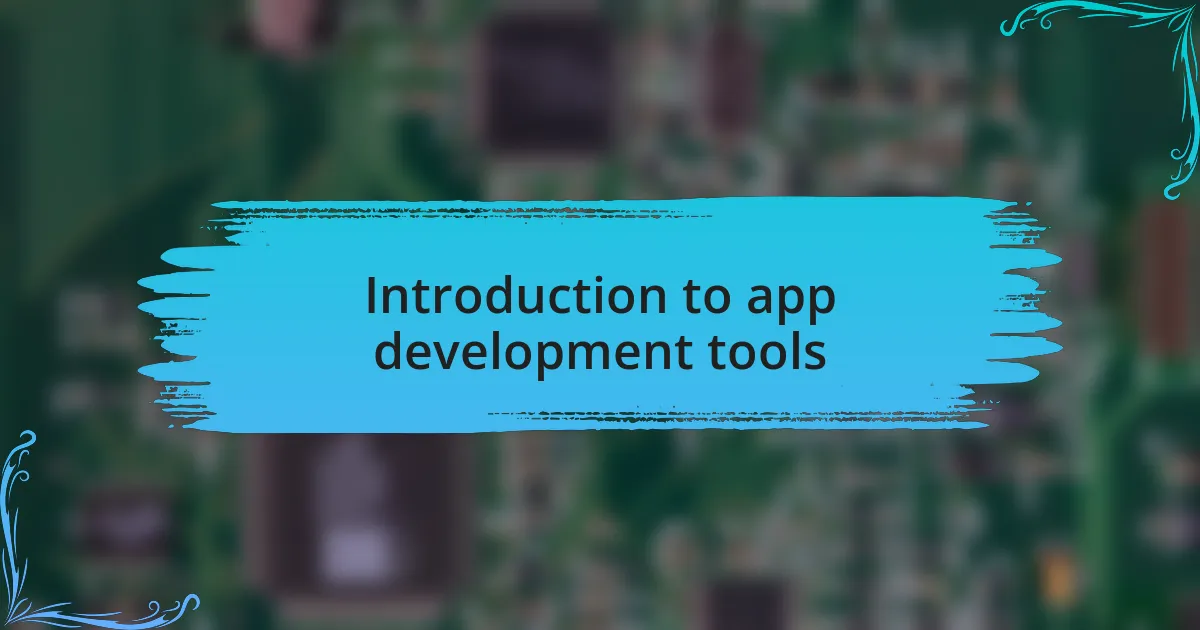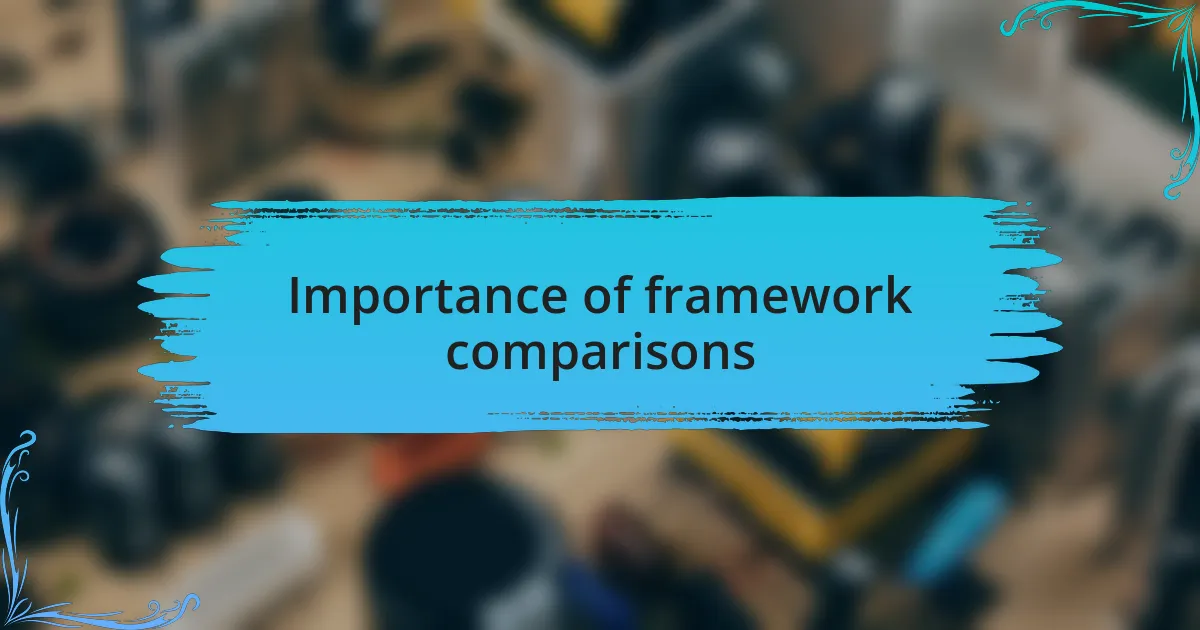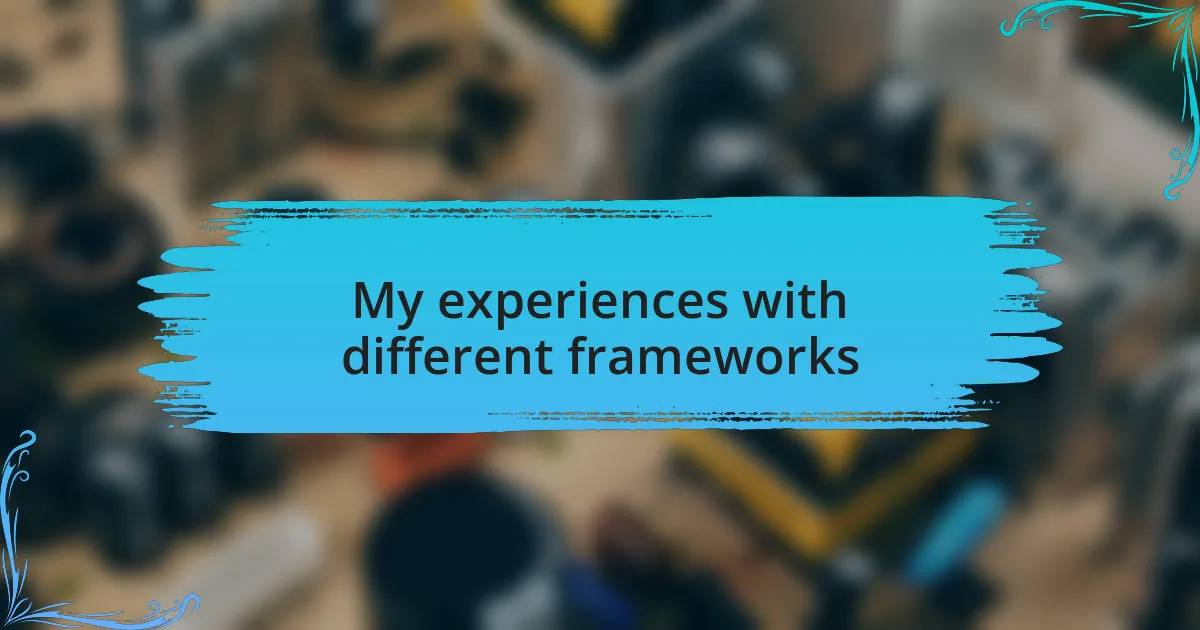Key takeaways:
- Choosing the right app development tool can significantly impact efficiency and overall project success.
- Framework comparisons are essential to identify strengths, weaknesses, and community support specific to project needs.
- Personal experiences with frameworks, like React Native and Flutter, highlight the importance of selecting tools that enhance workflow and creativity.
- Evaluating frameworks through small projects and assessing performance metrics helps ensure they meet practical requirements before full implementation.

Introduction to app development tools
When I first dipped my toes into app development, I was overwhelmed by the variety of tools available. Each tool promises to simplify the process, but which one truly delivers for the specific needs of your project? This pivotal choice can significantly impact your development journey, shaping not just the efficiency of building the app, but also its ultimate success.
I’ve found that app development tools range from low-code platforms, which are fantastic for rapid prototyping, to more robust environments for seasoned developers. It’s fascinating how these tools cater to different skill levels and project scopes, allowing beginners to bring their ideas to life while giving experts the freedom to innovate. How cool is it that a simple drag-and-drop interface can empower someone who has never coded before?
In my journey, I’ve seen how the right app development tool can turn frustration into flow. When I stumbled upon a user-friendly framework that aligned perfectly with my vision, it felt like finally finding the missing piece of a puzzle. It’s this harmony that not only accelerates the development process but also fuels creativity and innovation. What experiences have you had with different tools?

Importance of framework comparisons
Choosing the right framework is crucial, as it can either streamline your development process or complicate it further. I remember when I was evaluating various options, I felt a mix of excitement and anxiety. Each framework offered different features, and comparing them helped me identify the ones that truly met my project’s requirements. Have you ever felt that rush of discovering a tool that perfectly aligns with what you envision?
Framework comparisons allow developers to weigh the strengths and weaknesses of each option clearly. From my personal experience, analyzing community support, documentation, and scalability made a world of difference. Engaging with fellow developers revealed insights I hadn’t considered, confirming that some frameworks perform better in certain scenarios than others. How often do we overlook community feedback, thinking we can figure it out alone?
On top of that, understanding the nuances of different frameworks can lead to unexpected innovations in our projects. I distinctly recall a time when I selected a lesser-known framework after thorough comparison, and it ended up offering unique functionalities that propelled my app to the next level. Isn’t it fascinating how a deep dive into comparisons can unlock new possibilities?

My experiences with different frameworks
Exploring various frameworks has truly been an eye-opening experience for me. I remember diving into React Native when my project needed cross-platform compatibility. At first, I was overwhelmed by its ecosystem, but as I integrated it into my workflow, I discovered how seamless and efficient development could be. Did you know that a well-structured framework can significantly reduce your coding time?
On another occasion, I tried out Flutter for a different app, and the instant feedback feature blew me away. It was like having a real-time dialogue with the app I was building. I felt the excitement of seeing changes instantly, which not only accelerated my learning curve but also boosted my creativity. How often do you find yourself inspired by the tools you use while developing?
Then there was the time I experimented with Django for a web project. Its robust admin interface was a game changer for my development speed, but I initially struggled with its conventions. It reminded me that every powerful tool comes with a learning curve. Have you ever pushed through frustration to unlock a new skill? That journey made me appreciate the framework’s design philosophy and ultimately enhanced my ability to bring complex ideas to life.

Practical tips for framework evaluation
When evaluating frameworks, I always prioritize looking for community support and documentation. I vividly recall a moment when I was stuck using Angular, and finding extensive tutorials online made all the difference in getting past that hurdle. Have you faced moments where solid documentation saved your project?
Testing a framework with a small project before fully committing is another practice I’ve adopted. I once tried out Vue.js for a side project, and by applying its features in a manageable setting, I could assess its fit for my more extensive needs without diving in headfirst. How often do we take the plunge without a safety net?
Lastly, assessing performance benchmarks early on is crucial. I remember measuring load times and responsiveness while experimenting with different web frameworks, and those metrics directly influenced my decision-making. Do you often consider metrics when making choices? By focusing on performance from the get-go, I find that I can ensure a smoother experience for users down the line.